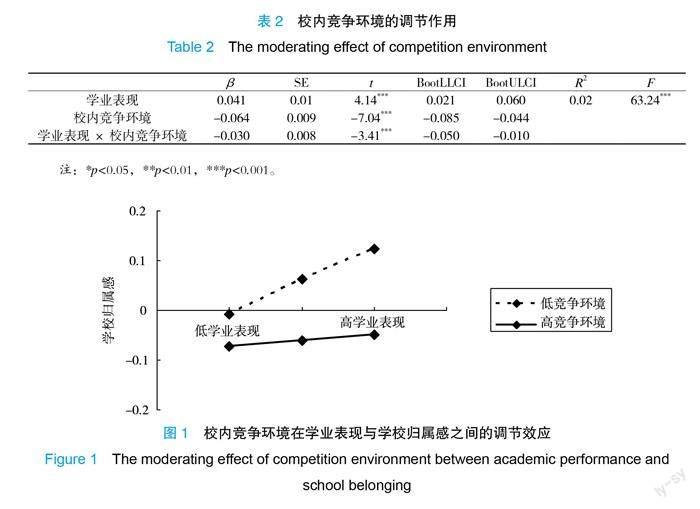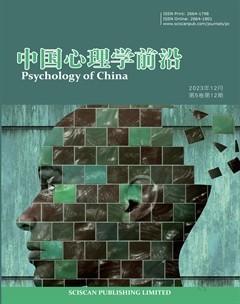中學生學業表現對學校歸屬感的影響:校內競爭環境的調節作用
張穎書


摘 要|基于PISA2018(Program for International Student Assessment,2018)調查研究中我國北京、上海、江蘇、浙江四省(市)共11,760名中學生數據探討了學業表現對學生學校歸屬感的影響以及校內競爭環境的調節作用。結果表明:中學生學業表現正向預測其學校歸屬感;校內競爭環境在學業表現與學校歸屬感的關系中起調節作用,具體而言,在低競爭的校內環境中,學業表現對學校歸屬感的預測作用顯著,而在高競爭的校內環境中,學業表現對學校歸屬感的預測作用不顯著。對于學校而言,應重視學生的歸屬需求,以促進學生心理健康發展。
關鍵詞|學業表現;學校歸屬感;中學生
Copyright ? 2023 by author (s) and SciScan Publishing Limited
This article is licensed under a Creative Commons Attribution-NonCommercial 4.0 International License. https://creativecommons.org/licenses/by-nc/4.0/
1 引言
學校歸屬感一般指的是學生在校內感受到被接受、尊重、包容和支持的程度[1],反映了學生與學校間的情感聯結,是學生幸福感的主要來源之一[2]。在校內,擁有良好歸屬感的學生往往對學校持有積極的態度,更愿意參與人際和學業活動[3],進而獲得更多積極心理收益。而低水平的歸屬感往往導致學生對學校的消極態度、甚至產生輟學心理[4,5],也是進一步引發學生一系列內化和外化問題的重要因素[6,7]。因此,有必要深入探究學生學校歸屬感的影響因素,以促進學生的身心健康發展。
研究表明,學校歸屬感的建立主要來源于學生在校內的積極經歷,主要包括人際和學業兩個方面[8,9]。在中學階段,學校生活圍繞學業任務展開,學生開始面臨更多的學業挑戰。在這一過程中,順利完成學業任務、取得良好成績的學生往往有更多的積極情緒和更好的學習投入[10],更容易建立學習的內部動機[11],也更容易獲得教師、同伴的肯定,發展積極的人際關系[12]。而學習困難、成績較差的學生往往產生更多消極情緒,對學業任務、任課教師甚至學校環境產生倦怠、厭惡心理[13],更容易遭受同伴孤立[14]。因此,高學業表現的學生在校內往往有更多的積極經歷,進而有更多關于學校的積極體驗。以往研究大多將學業表現作為結果變量,研究學校歸屬感對學業表現的影響[15]。但學業表現本身作為學生在校內的重要經歷,也是影響學生歸屬感建立的重要因素。基于此,本研究探討的第一個問題是中學生學業表現如何影響其學校歸屬感,并提出假設1:中學生學業表現正向預測學校歸屬感。
在中學階段,學生即將面臨中考所帶來的第一次學業“分流”,激增的學業壓力引發了以競爭為主導的學校氛圍,主要表現為校內“唯分數”“重結果”的考評標準以及學生之間持續的社會比較[16]。以往研究表明,高競爭度的學校環境往往導致學生過大的學業壓力,進而引發消極的學業態度[17]。同時,不斷的排名和比較也導致學生的學業動機逐漸轉向外部[18],學習的目標不再是提升能力,而是獲得他人的正面評價、避免負面評價[19]。因此,在高競爭的學校環境中,學業表現良好的學生可能僅將學業任務視為考評的工具,學習內部動機減弱;學業表現較差的學生則遭受了更多的打擊。這皆不利于其學校歸屬感的培養。基于此,本研究提出假設2:校內競爭環境在中學生學業表現與學校歸屬感的關系中起調節作用,在高競爭的學校環境中,學業表現對學校歸屬感的預測作用減弱。
2 研究方法
2.1 研究對象
本研究數據全部來源于OECD發布的2018年國際學生評估項目(programme for international student assessment,PISA)測試結果。PISA是由世界經濟合作與發展組織(Organization for Economic Cooperation and Development)籌劃的對全世界15歲學生學習水平的測試計劃,最早開始于2000年,每三年進行一次。測試內容主要針對學生的閱讀、數學和科學素養,以及其他非認知能力。目前,PISA測試已涉及全球90多個國家和經濟體,是目前世界上最具影響力的國際學生學習評價項目之一[20]。本研究在剔除缺失數據后,共使用來自中國四個省市(北京、上海、江蘇、浙江)的樣本11,760個,其中女性占比47.9%。男性占比52.1%。
2.2 研究工具
2.2.1 學業表現
PISA2018分別設置了10個似真值(plausible value,PV)以評估學生的閱讀、數學、科學素養,分值越高相應學科的素養水平越高。本研究將學生閱讀、數學、科學的似真值相加后取平均數作為衡量學生學業表現的指標,分值越高,學業表現越好。
2.2.2 學校歸屬感
PISA學生問卷中設置了6道題目測量學生的學校歸屬感水平,包括:“在學校里我感覺自己是個局外人”,“在學校里我能很輕松地交到朋友”,“我感覺自己是學校的一員”,“我在學校里感到尷尬和格格不入”,“其他同學看起來喜歡我”,“我在學校里感覺很孤單”。回答從“完全同意”到“完全不同意”進行4點計分,第2、3、5題為反向計分。將所有題目得分相加得到總分,分值越高,學生學校歸屬感水平越高。量表在本研究中的Cronbachs α系數為0.832。
2.2.3 校內競爭環境
PISA學生問卷中設置了4道題目測量學生感知校內競爭環境的程度,包括:“同學們都很看重競爭”,“同學之間相互競爭”,“大家似乎都覺得相互競爭是重要的”和“大家被鼓勵和其他同學競爭”,回答從“完全不正確”到“非常正確”進行4點計分。將所有題目的分數相加得到總分,分值越高,學生感知到競爭環境的程度越高。量表在本研究中的Cronbach s α系數為0.813。
2.3 統計處理
本研究的數據處理基于SPSS 21.0 和 SPSS 宏程序 PROCESS 插件。首先,對所有數據進行描述統計和相關分析。隨后,將數據進行標準化,使用 PROCESS 中的 Model 1分析學業表現對學校歸屬感的預測作用以及校內競爭環境在二者關系中的調節作用(性別和家庭社會經濟地位作為控制變量)。
3 研究結果
3.1 共同方法偏差檢驗
采用 Harman 單因素檢驗法進行共同方法偏差檢驗[21],結果顯示,特征根大于1的因子共有2個,最大因子的方差解釋度為33.08%,小于40%的臨界標準,因此可以認為本研究不存在明顯的共同方法偏差問題。
3.2 描述統計和相關分析
根據表1 的描述統計和相關分析結果,研究各變量之間均存在顯著相關。其中,學業表現與學校歸屬感呈顯著正相關(r=0.085,p<0.01),校內競爭環境與學校歸屬感呈顯著負相關(r=-0.042,p<0.01),校內競爭環境與學業表現呈顯著正相關(r=0.116,p<0.01)。
3.3 校內競爭環境的調節作用
校內競爭環境的調節作用如表2所示。結果表明,學業表現對學校歸屬感的正向預測作用顯著(β=0.041,t=4.14,p<0.001,95% CI=[0.021,0.060])。學業表現與校內競爭環境的交互項對學校歸屬感的預測作用顯著且為負(β=-0.030,t=-3.41,p<0.001,95% CI=[-0.050,-0.010]),校內競爭環境顯著調節了學業表現對學校歸屬感的影響。
為更直觀地展現學業表現與校內競爭環境的交互作用對學校歸屬感的影響,本研究進一步做了簡單斜率分析,如圖1所示。結果表明,在低競爭的學校環境中,學業表現對學校歸屬感的正向預測作用顯著(Bsimple=0.06,t=5.42,p<0.001,95% CI=[0.042,0.090]);而在高競爭的學校環境中,學業表現對學校歸屬感的正向預測作用不顯著(Bsimple=0.01,t=0.85,p=0.394,95% CI=[-0.014,0.037])
4 結論與討論
本研究結果表明,中學生學業表現能夠顯著正向預測其學校歸屬感。作為學生取得學業成功的重要經歷,良好的學業表現不僅是學生建立自我效能感、培養學習內部動機的前提[22],也是學生獲得能力需求的滿足,進而發展各種積極心理因素的重要條件[23][24]。特別是在中學階段,學業表現作為衡量學生能力水平的重要指標之一,直接反映著學生學校生活的質量。對于學業表現良好的學生而言,其在學業方面的積極經歷能夠加強與學校的情感聯結,進而帶來更多的學校參與。而對于學業表現不佳的學生而言,其在學業方面的挫折經歷導致其對學校生活產生更多負面情緒,這又進一步引發了其低水平的學校參與,并可能逐漸形成一種不良循環。總之,中學生在校內取得良好的學業表現有利于其學校歸屬感的培養。
本研究結果也表明,校內競爭環境顯著調節了中學生學業表現與學校歸屬感的關系。在低競爭的校內環境中,中學生學業表現正向預測其學校歸屬感,而在高競爭的校內環境中,學業表現對學校歸屬感的預測作用不顯著。這一結果與社會相互依賴理論的觀點一致[25]。在高競爭的校內環境中,學生需要通過與他人比較并超越他人而取得學業成功,這使得校內人際互動趨于對立[26],不利于學生之間培養和諧的人際關系。同時,在高競爭環境下,學生更加追求表現目標而非掌握目標[27],越來越關注自我的等級和評價,學習內部動機降低[28]。這也導致取得良好的學業表現只能作為外部評價指標,而無法轉化為學生內部的積極因素。尤其對于學業表現較差的學生而言,在競爭中屢屢受挫的經歷導致其更低水平的學校歸屬感,這可能促使他們轉向其他非學校性的團體尋求歸屬(如幫派、暴力團伙等)[29],這進一步引發了未來更多輟學和犯罪的可能性[30]。
5 教育建議
本研究結果能夠為教育實踐提供一些可行建議:(1)學業表現雖然不是學生能力的唯一評價指標,但其在學生生活中的作用不可忽視。學業表現的好壞直接影響著學生的學校參與以及與學校的情感聯結。作為教育者,在教育過程中應盡最大努力讓學生學有所得、學有所長,讓每位學生都能“不掉隊”。尤其對于本身學業表現不佳的學生來說,教育者應秉持“不放棄”的原則,重視培養他們的學習動機和學習興趣,看到他們的點滴進步并及時給予積極反饋,逐步使他們建立學業自信,培養學校歸屬感,進而發展更好的學業參與度;(2)當下激烈的學業競爭環境不可避免,作為教育者,要引導學生樹立良好心態,直面失敗,遭遇挫折不氣餒、不內耗。在教育評價的過程中,也不能以分數、名次作為評判的唯一標準,因材施教、關注學生全面發展。在教育的全過程里,教育者應密切關注學生的心理狀態,杜絕打擊式教育,倡導鼓勵、支持,和學生建立平等的溝通關系。尤其對于成績不佳的學生而言,教育者更要密切關注他們的身心動態,以防其出現與學校脫離等不良結果;(3)學校管理者應重視校園氛圍建設,創建平等、安全、和諧的人際環境。在日常的學習生活中,學校可以通過組織多種類型的集體活動以促進師生之間、學生之間的溝通和交流,這也可以使學生疏解壓力、放松心情,進而更好地投入學校生活;(4)在青春期階段,中學生正處于高度關注自我、關注身份和對社會比較非常敏感的時期[31],對于教育者而言,需要關注他們的心理需求,滿足其歸屬需要,進而促進學生的身心健康發展。
參考文獻
[1]Goodenow C,Grady K E.The relationship of school belonging and friends' values to academic motivation among urban adolescent students[J].The journal of experimental education,1993,62(1):60-71.
[2]Tian L,Zhang L,Huebner E S,et al.The longitudinal relationship between school belonging and subjective well-being in school among elementary school students[J].Applied Research in Quality of Life,2016(11):1269-1285.
[3]Y?ld?r?m M,Y?ld?r?m-Kurtulu? H,Batmaz H,et al.School Belongingness and Internalizing and Externalizing Problems in Adolescents:Exploring the Influence of Meaningful School[M].Child Indicators Research,2023:1-16.
[4]Mc Cray E D.It's 10 am:Do you know where your children are? The persisting issue of school truancy[J].Intervention in school and clinic,2006,42(1):30-33.
[5]Fong Lam U,Chen W W,Zhang J,et al.It feels good to learn where I belong:School belonging,academic emotions,and academic achievement in adolescents[J].School Psychology International,2015,36(4):393-409.
[6]Henry K L.Academic achievement and adolescent drug use:An examination of reciprocal effects and correlated growth trajectories[J].Journal of School Health,2010,80(1):38-43.
[7]Cruwys T,Dingle G A,Haslam C,et al.Social group memberships protect against future depression,alleviate depression symptoms and prevent depression relapse[J].Social science & medicine,2013(98):179-186.
[8]Slaten C D,Ferguson J K,Allen K A,et al.School belonging:A review of the history,current trends,and future directions[J].The Educational and Developmental Psychologist,2016,33(1):1-15.
[9]Allen K,Kern M L,Vella-Brodrick D,et al.What schools need to know about fostering school belonging:A meta-analysis[J].Educational Psychology Review,2018(30):1-34.
[10]Korhonen J,Linnanm?ki K,Aunio P.Learning difficulties,academic well-being and educational dropout:A person-centred approach[J].Learning and individual differences,2014(31):1-10.
[11]Ryan R M,Deci E L.Intrinsic and extrinsic motivations:Classic definitions and new directions[J].Contemporary educational psychology,2000,25(1):54-67.
[12]Wentzel K R,Jablansky S,Scalise N R.Peer social acceptance and academic achievement:A meta-analytic study[J].Journal of Educational Psychology,2021,113(1):157.
[13]Evers K,Chen S,Rothmann S,et al.Investigating the relation among disturbed sleep due to social media use,school burnout,and academic performance[J].Journal of adolescence,2020(84):156-164.
[14]Xiong Q,Shi S,Chen J,et al.Examining the link between academic achievement and adolescent bullying:a moderated moderating model[J].Psychology research and behavior management,2020:919-928.
[15]宋煒玲,劉玉林,周春燕.教育價值觀對農村留守兒童學業成績的影響:自我控制和學校歸屬感的作用[J].中國健康心理學雜志,2023,31(2):275-281.
[16]李文燁.競爭與合作:哪種學校氛圍更利于學生的發展:基于PISA 2018的數據分析[J].教育測量與評價,2021(10):27-34.
[17]Zhang W,Li H,Gong Y,et al.Stressful events and depression among Chinese adolescents:The mitigating role of protective factors[J].School Psychology International,2013,34(5):501-513.
[18]Lam S F,Yim P S,Law J S F,et al.The effects of competition on achievement motivation in Chinese classrooms[J].British Journal of Educational Psychology,2004,74(2):281-296.
[19]Fry P S,Coe K J.Interaction among dimensions of academic motivation and classroom social climate:A study of the perceptions of junior high and high school pupils[J].British Journal of Educational Psychology,1980,50(1):33-42.
[20]Schleicher A.PISA 2018:Insights and interpretations[R].OECD Publishing,2019.
[21]Podsakoff P M,Mac Kenzie S B,Lee J Y,et al.Common method biases in behavioral research:a critical review of the literature and recommended remedies[J].Journal of applied psychology,2003,88(5):879.
[22]Bandura A.Self-efficacy mechanism in human agency[J].American psychologist,1982,37(2):122.
[23]Ryan R M,Deci E L.Self-determination theory and the role of basic psychological needs in personality and the organization of behavior[J].2008.
[24]Tian L,Zhao J, Huebner E S.School-related social support and subjective well-being in school among adolescents:The role of self-system factors[J].Journal of adolescence,2015(45):138-148.
[25]Johnson D W,Johnson R T.An educational psychology success story:Social interdependence theory and cooperative learning[J].Educational researcher,2009,38(5):365-379.
[26]Roseth C J,Johnson D W,Johnson R T.Promoting early adolescents' achievement and peer relationships:the effects of cooperative,competitive,and individualistic goal structures[J].Psychological bulletin,2008,134(2):223.
[27]Dweck C S.Motivational processes affecting learning[J].American psychologist,1986,41(10):1040.
[28]Vu N C,Hooker J F, Simonds C J.Cooperative,competitive,or individualistic? Exploring the role of social interdependence in the classroom[J].Communication Education,2021,70(3):247-265.
[29]Allen K A, Kern M L.School belonging in adolescents:Theory,research and practice[M].Singapore:Springer Singapore,2017.
[30]Roffey S,Boyle C.Belief,belonging and the role of schools in reducing the risk of home-grown extremism[M]//In Pathways to Belonging.Brill,2018:149-164.
[31]H?gberg B,Petersen S,Strandh M,et al.Determinants of declining school belonging 2000-2018:The Case of Sweden[J].Social Indicators Research,2021,157(2):783-802.
The Association between Academic Performance and School Belonging of Middle School Students: The Moderating Role of Competition Environment
Zhang Yingshu
School of Psychology, Faculty of Education, Guangxi Normal University, Guilin
Abstract: Using a representative sample of 11760 Chinese students from the Program for International Student Assessment 2018 (PISA 2018) to investigated the relationship between academic performance and school belonging of middle school students and the moderating role of competition environment. The result indicated that: Academic performance had a significant and positive predictive effect on school belonging and competition environment moderated this relationship: in a low-level competitive school environment, academic performance had a significant and positive predictive effect on school belonging. But in a high-level competitive school environment, such effect was no longer significant. For schools, the need for students to belong should be emphasized in order to promote their mental health.
Key words: Academic performance; School belonging; Middle school students

